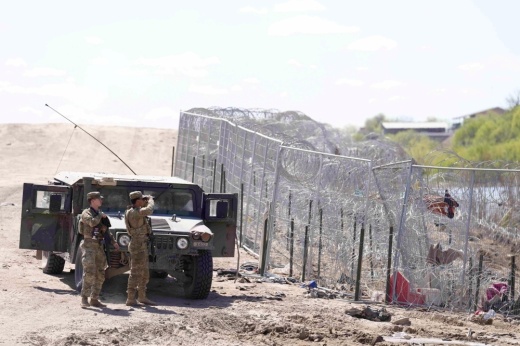In a 2-1 ruling issued minutes before midnight, a panel of judges from the 5th U.S. Circuit Court of Appeals denied Texas’ request to allow the law, known as Senate Bill 4, to take effect as a legal battle continues. The court is scheduled to hear arguments April 3 on the legality of SB 4.
One week earlier, the U.S. Supreme Court briefly allowed SB 4 to take effect March 19 before it was halted by the appeals court.
The background
SB 4 would allow state and local law enforcement to arrest migrants suspected of illegally crossing the Texas-Mexico border. Undocumented immigrants would face up to six months in jail or a $2,000 fine, while repeat offenders could face felony charges.
Judges could essentially deport migrants by ordering them to return to Mexico, regardless of their nationality.
The Biden administration and several immigrant advocacy groups sued Texas over SB 4, arguing the controversial law undermines the federal government’s ability to enforce immigration restrictions and harms relations with foreign countries.
Gov. Greg Abbott and other top Texas Republicans have frequently criticized President Joe Biden’s border policies and said the law is necessary to curb an “invasion” by migrants and drug cartels.
During a March 20 hearing, Texas Solicitor General Aaron Lloyd Nielson asked the 5th Circuit court to uphold SB 4, asserting that the state has “a right to defend itself” against record illegal border crossings. The Texas Attorney General’s Office did not respond to a request for comment March 27.
What you need to know
“For nearly 150 years, the Supreme Court has held that the power to control immigration—the entry, admission and removal of noncitizens—is exclusively a federal power,” Chief Judge Priscilla Richman wrote in the ruling. “Despite this fundamental axiom, SB 4 creates separate, distinct state criminal offenses and related procedures regarding unauthorized entry of noncitizens into Texas from outside the country and their removal.”
Richman also noted that SB 4 gives Texas judges “unilateral power” to order undocumented migrants to cross into Mexico without input from federal immigration officials.
“A large number of noncitizens who crossed into Texas from Mexico are not citizen or residents of Mexico,” the order reads. “Nevertheless, under Texas law they would be removed to Mexico. The United States would have no voice in the matter.”
On March 21, the Mexican government filed a brief warning that allowing SB 4 to take effect would cause “substantial tension” with the United States. Mexican officials have said they will not accept deportations from Texas.
Immigrant rights organizations celebrated the appeals court’s decision.
“[The ruling] is the first step towards securing accountability for the state of Texas for risking the health, safety, and standards of Texas residents,” said Jennifer Babaie, the director of advocacy and legal services for the El Paso-based Las Americas Immigrant Advocacy Center. “Today’s decision is not the end of this legal battle, and immigrants and Texans of color across our state should remain vigilant, know their rights and have a plan to protect themselves and their families. We will not stop fighting until this law is struck down for good.”
Another viewpoint
In a dissenting opinion, Judge Andrew Oldham, who formerly served as Abbott’s general counsel, argued that “this entire case is based on hypotheticals” because Texas officials have not yet made arrests or deported migrants under SB 4.
Oldham wrote the court should allow SB 4 to take effect and reconsider the case in the future if “an actual conflict [arises] between state and federal law.”
“Enforcement of SB 4 will decrease illegal border crossings and associated harms like drug and human trafficking,” he wrote. “That decrease is obviously in the public interest, especially since the influx of illegal immigrants affects many more states than just Texas.”
Looking ahead
Lawyers for Texas, the U.S. Department of Justice, El Paso County and the American Civil Liberties Union are expected to present arguments to the same three-judge panel April 3 in New Orleans.
The case could later return to the Supreme Court.





